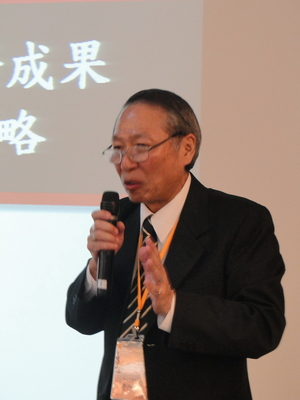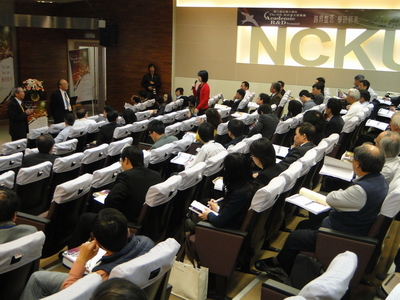NCKU Vice-President Hwung Shared Thoughts on Industrialization of University R&D Achievements


Tainan, Taiwan, December 21st, 2010
Senior Executive Vice-President Hwung-Hweng Hwung of National Cheng Kung University (NCKU), Tainan, Taiwan, has shared his thoughts on the important strategies which will help promote industrialization of research and development achievements in universities with dozens of presidents, business managers, research and development heads, as well as government personnel, on December 21st in the 6th Academic R&D Summit, receiving zealous response and questions from the audiences.
NCKU Senior Executive Vice-President Hwung-Hweng Hwung believed that the implementation of the industrialization of research and development achievements should rely on the joint efforts of universities, government and the industry, and the excellent communication between the universities and the industry should depend on professional teams assisting industry-academia cooperation and government establishing complete regulations to help the industrialization, and the industry upon receiving the achievements should give back, thus achieving a virtuous circle.
NCKU Honorary Prof. Cheng-I Weng, the host of the conference, revealed, “In the face of government reducing funds and birthrate declining, universities today normally face the difficulties of increasing their revenue. Universities are the place where outstanding talents gather together. Even though professors publish many papers to elevate their academic standard each year, the papers are not helpful to improve the financial resources of the universities. Thus, the creation of practical values of the research and development achievements by the professors can help universities raise funds.”
“The first university in the world was established in 1088 in Italy, with the sole purpose of teaching. It was not until the 15th century that it started doing research and it was not until the 1950s that United States had linked universities and society together. In 1980, United States had passed an act which clearly states that patent technology transfer, produced under the funds from the government, must put to the industry, finally indicating the functions of a university, which consist of teaching, research and service. Thus, it is evident that the functions of a university adjust to social changes,” said NCKU Senior Executive Vice-President Hwung-Hweng Hwung in his speech.
In Taiwan, National Science Council, Executive Yuan, had initiated Science and Technology Basic Act, starting to promote science-oriented industrial cooperation, and in recent years, the Ministry of Education, Taiwan, has been promoting Project of Increasing Master-Level Industrial RD Manpower, and National Science Council has been promoting cross-disciplinary industry-academia platform, illustrating the government’s emphasis on university functions.
The current research and development manpower in Taiwan consists of approximately 240,000 research, technological and support personnel, and among them, the research manpower is approximately 130,000 people, including 30,000 doctoral personnel, where universities occupy approximately 75%, revealing that Taiwan’s research resources mainly focus on universities. Thus, if resources at universities are not used effectively, it will be unfortunate for the nation. According to the analysis done by Intellectual Property Office, Ministry of Economic Affairs, in 2006, the international patent industrialization ratio is about 3% and the ratio in Taiwan is about 0.3%, showing that Taiwan still has a lot of room for improvement.
NCKU Senior Executive Vice-President Hwung-Hweng Hwung stated, “It is easier said than done. First of all, universities tend to focus on academic research, which often result in unpractical and unsalable products. How to transfer something useful onto the industry is worth considerable consideration of the government. However, there are many regulations and procedures that are still incomplete in Taiwan. I hope the government can set them up as soon as possible.”
Vice-President Hwung-Hweng Hwung further explained, “Also, because professors lack contact with the industry, they do not understand the cost of the improvement process of an item or the social demands. The Ministry of Education should think carefully about merely focusing on papers rather than industry-academia achievements. National Science Council should also take industry-academia into account and if the Council can transform it into a policy, the promotion of industry-academia will be easier.”
The transfer of research and development achievements to industry requires professional assistance. For a transfer to be successful, the technology needs to be industrialized and have a professional team. In United States, nearly all universities with excellent industry-academia cooperation have special offices, where professional teams will assist professors understand the features of the technology and then help them to seek business owners, and even help find solutions when they encounter legal issues.
NCKU Senior Executive Vice-President Hwung-Hweng Hwung emphasized, “Universities have the social responsibilities to elevate industrial-academia industrialization. The higher the industrialization of research and development achievements, the greater the contributions to the society become.”
National Cheng Kung University, for instance, has 60 to 70 patent applications and about 3 or 4 successful technological transfer cases annually, much higher than the average 0.3% patent industrialization in Taiwan and reaching the international ratio of 3%, being the only university in Taiwan with recent technology transfer payments exceeding over NT$100,000,000.
Senior Executive Vice-President Hwung-Hweng Hwung of National Cheng Kung University (NCKU), Tainan, Taiwan, has shared his thoughts on the important strategies which will help promote industrialization of research and development achievements in universities with dozens of presidents, business managers, research and development heads, as well as government personnel, on December 21st in the 6th Academic R&D Summit, receiving zealous response and questions from the audiences.
NCKU Senior Executive Vice-President Hwung-Hweng Hwung believed that the implementation of the industrialization of research and development achievements should rely on the joint efforts of universities, government and the industry, and the excellent communication between the universities and the industry should depend on professional teams assisting industry-academia cooperation and government establishing complete regulations to help the industrialization, and the industry upon receiving the achievements should give back, thus achieving a virtuous circle.
NCKU Honorary Prof. Cheng-I Weng, the host of the conference, revealed, “In the face of government reducing funds and birthrate declining, universities today normally face the difficulties of increasing their revenue. Universities are the place where outstanding talents gather together. Even though professors publish many papers to elevate their academic standard each year, the papers are not helpful to improve the financial resources of the universities. Thus, the creation of practical values of the research and development achievements by the professors can help universities raise funds.”
“The first university in the world was established in 1088 in Italy, with the sole purpose of teaching. It was not until the 15th century that it started doing research and it was not until the 1950s that United States had linked universities and society together. In 1980, United States had passed an act which clearly states that patent technology transfer, produced under the funds from the government, must put to the industry, finally indicating the functions of a university, which consist of teaching, research and service. Thus, it is evident that the functions of a university adjust to social changes,” said NCKU Senior Executive Vice-President Hwung-Hweng Hwung in his speech.
In Taiwan, National Science Council, Executive Yuan, had initiated Science and Technology Basic Act, starting to promote science-oriented industrial cooperation, and in recent years, the Ministry of Education, Taiwan, has been promoting Project of Increasing Master-Level Industrial RD Manpower, and National Science Council has been promoting cross-disciplinary industry-academia platform, illustrating the government’s emphasis on university functions.
The current research and development manpower in Taiwan consists of approximately 240,000 research, technological and support personnel, and among them, the research manpower is approximately 130,000 people, including 30,000 doctoral personnel, where universities occupy approximately 75%, revealing that Taiwan’s research resources mainly focus on universities. Thus, if resources at universities are not used effectively, it will be unfortunate for the nation. According to the analysis done by Intellectual Property Office, Ministry of Economic Affairs, in 2006, the international patent industrialization ratio is about 3% and the ratio in Taiwan is about 0.3%, showing that Taiwan still has a lot of room for improvement.
NCKU Senior Executive Vice-President Hwung-Hweng Hwung stated, “It is easier said than done. First of all, universities tend to focus on academic research, which often result in unpractical and unsalable products. How to transfer something useful onto the industry is worth considerable consideration of the government. However, there are many regulations and procedures that are still incomplete in Taiwan. I hope the government can set them up as soon as possible.”
Vice-President Hwung-Hweng Hwung further explained, “Also, because professors lack contact with the industry, they do not understand the cost of the improvement process of an item or the social demands. The Ministry of Education should think carefully about merely focusing on papers rather than industry-academia achievements. National Science Council should also take industry-academia into account and if the Council can transform it into a policy, the promotion of industry-academia will be easier.”
The transfer of research and development achievements to industry requires professional assistance. For a transfer to be successful, the technology needs to be industrialized and have a professional team. In United States, nearly all universities with excellent industry-academia cooperation have special offices, where professional teams will assist professors understand the features of the technology and then help them to seek business owners, and even help find solutions when they encounter legal issues.
NCKU Senior Executive Vice-President Hwung-Hweng Hwung emphasized, “Universities have the social responsibilities to elevate industrial-academia industrialization. The higher the industrialization of research and development achievements, the greater the contributions to the society become.”
National Cheng Kung University, for instance, has 60 to 70 patent applications and about 3 or 4 successful technological transfer cases annually, much higher than the average 0.3% patent industrialization in Taiwan and reaching the international ratio of 3%, being the only university in Taiwan with recent technology transfer payments exceeding over NT$100,000,000.
Provider:
新聞中心
Date:
99-12-28